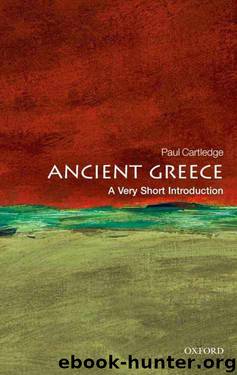Ancient Greece: A Very Short Introduction (Very Short Introductions) by Paul Cartledge

Author:Paul Cartledge [Cartledge, Paul]
Language: eng
Format: epub, mobi
Publisher: Oxford University Press
Published: 2011-10-26T16:00:00+00:00
10
THEBES
This has come from my counsel:
Sparta has cut the hair of her glory:
Messene takes her children in:
a wreath of the spears of Thebe
has crowned Megalopolis:
Greece is free.
(Epitaph of Epaminondas, d. 362, as
preserved by Pausanias, Description of
Greece, trans. P. Levi)
The chief beneficiary of the mutual attrition of the Athenians and the Spartans was Sparta’s central Greek ally, Thebes. Here is another city with a foothold deep in mythic territory. It was the birthplace of the god Dionysus and of the überhero-turned-god Heracles, and (though his failure to realize it at first was to prove tragically fatal for him) of King Oedipus. It was also the target residence of choice for famous immigrant Cadmus from Phoenicia, who was credited anachronistically with bringing with him from Tyre the art of alphabetic writing; the Greeks with rather surprising humility referred to their alphabet as either ‘Phoenician’ or ‘Cadmean’ letters. Were the modern town of Thebes not plonked directly on top of the ancient prehistoric and historic cities, we would know an awful lot more about the prehistoric city built upon the Cadmea acropolis, with its Mycenaean palace that has yielded the most recent sizeable haul of Linear B texts—including use of a word that looks something like ‘Lacedaemon’, the name of the region of the southeast Peloponnese that Sparta came to dominate.
Historical Thebes too had its major points of cultural interest, notwithstanding the fact that their snooty neighbours in Athens liked to sneer at the The-bans as mere ‘Boeotian swine’. For in the late sixth century Thebes produced the leading lyric poet Pindar (c.518–446)—not to mention that Hesiod (flourished c.700) had also been a Boeotian, from the village of Ascra within the city of Thespiae. Thebes, moreover, developed and controlled a flourishing federal state, which offered an original and alternative mode of political organization to the single polis. For some decades in the fourth century BCE Thebes was actually the single most powerful city in mainland Greece and a forcing-house of the political transformation that eventuated through the reigns of the Macedonian kings Philip II and his son Alexander the Great.
Some sort of Boeotia-wide federation was in existence before the last quarter of the sixth century. A common silver coinage bearing the obverse device of an infantryman’s shield attests a form of political unity, since coinage in Greece was always as much a political as an economic manifestation. This unity was expressed and reinforced in the characteristic Greek way, by a common religious cult: the Pamboeotia (‘All-Boeotia Festival’) celebrated annually at Onchestus. Another major Boeotian sanctuary that flourished in the sixth century was the Ptoion, not far from Thebes, which was dedicated to Apollo. As many as a hundred lifesize marble statues of the kouros (naked youth) type were dedicated here, a sure index of great local wealth as well as piety.
Boeotian unity, however, let alone unification, was never complete. Far from it. Indeed, such was the intestine strife among the cities of Boeotia that Pericles—admittedly not a disinterested witness—likened the Boeotians to tall trees, whose tops crash together in a storm and act as their own executioners.
Download
Ancient Greece: A Very Short Introduction (Very Short Introductions) by Paul Cartledge.mobi
This site does not store any files on its server. We only index and link to content provided by other sites. Please contact the content providers to delete copyright contents if any and email us, we'll remove relevant links or contents immediately.
The Daily Stoic by Holiday Ryan & Hanselman Stephen(3297)
The Fate of Rome: Climate, Disease, and the End of an Empire (The Princeton History of the Ancient World) by Kyle Harper(3055)
People of the Earth: An Introduction to World Prehistory by Dr. Brian Fagan & Nadia Durrani(2726)
Ancient Worlds by Michael Scott(2678)
Babylon's Ark by Lawrence Anthony(2670)
The Daily Stoic by Ryan Holiday & Stephen Hanselman(2564)
Foreign Devils on the Silk Road: The Search for the Lost Treasures of Central Asia by Peter Hopkirk(2454)
India's Ancient Past by R.S. Sharma(2448)
MOSES THE EGYPTIAN by Jan Assmann(2411)
The Complete Dead Sea Scrolls in English (7th Edition) (Penguin Classics) by Geza Vermes(2269)
Lost Technologies of Ancient Egypt by Christopher Dunn(2219)
The Earth Chronicles Handbook by Zecharia Sitchin(2216)
24 Hours in Ancient Rome by Philip Matyszak(2075)
Alexander the Great by Philip Freeman(2062)
Aztec by Gary Jennings(2019)
The Nine Waves of Creation by Carl Johan Calleman(1906)
Curse Tablets and Binding Spells from the Ancient World by Gager John G.;(1858)
Before Atlantis by Frank Joseph(1847)
Earthmare: The Lost Book of Wars by Cergat(1817)
